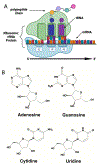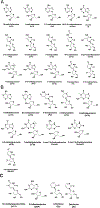Chemical modifications to mRNA nucleobases impact translation elongation and termination
- PMID: 35313212
- PMCID: PMC9373004
- DOI: 10.1016/j.bpc.2022.106780
Chemical modifications to mRNA nucleobases impact translation elongation and termination
Abstract
Messenger RNAs (mRNAs) serve as blueprints for protein synthesis by the molecular machine the ribosome. The ribosome relies on hydrogen bonding interactions between adaptor aminoacyl-transfer RNA molecules and mRNAs to ensure the rapid and faithful translation of the genetic code into protein. There is a growing body of evidence suggesting that chemical modifications to mRNA nucleosides impact the speed and accuracy of protein synthesis by the ribosome. Modulations in translation rates have downstream effects beyond protein production, influencing protein folding and mRNA stability. Given the prevalence of such modifications in mRNA coding regions, it is imperative to understand the consequences of individual modifications on translation. In this review we present the current state of our knowledge regarding how individual mRNA modifications influence ribosome function. Our comprehensive comparison of the impacts of 16 different mRNA modifications on translation reveals that most modifications can alter the elongation step in the protein synthesis pathway. Additionally, we discuss the context dependence of these effects, highlighting the necessity of further study to uncover the rules that govern how any given chemical modification in an mRNA codon is read by the ribosome.
Keywords: Kinetics; RNA modification; Translation; mRNA modification.
Copyright © 2022. Published by Elsevier B.V.
Conflict of interest statement
Declaration of Competing Interest
The authors declare that they have no known competing financial interests or personal relationships that could have appeared to influence the work reported in this paper.
Figures




References
Publication types
MeSH terms
Substances
Grants and funding
LinkOut - more resources
Full Text Sources
Other Literature Sources

